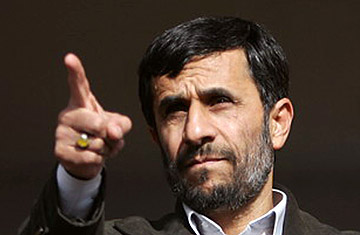
Iranian President Mahmoud Ahmadinejad.
A natural-born populist, Ahmadinejad cleverly expanded his support base after his election last year by turning Iran's quest to become a nuclear power into a nationalist cause. His outspoken defense of Palestinian rights, threat to wipe Israel off the map and questioning of the Jewish Holocaust have likewise made him a hero in much of the Muslim world. Coming at a time of dwindling American influence in Iraq and throughout the Middle East, Ahmadinejad's leadership is an emblem of a resurgent Iran that is assuming a role as a major regional power. Until now, his assertiveness has enabled him to set the agenda within a political system where foreign policy had been mainly in the hands of Supreme Leader Ayatullah Ali Khamenei and his Supreme National Security Council. When council head Ali Larijani recently seemed to indicate a willingness to freeze uranium enrichment in negotiations with European countries, Ahmadinejad quickly shot him down, publicly declaring that Iran would never take such a step.
However, the events of the last few days have starkly exposed the limits of Ahmadinejad's influence. He started out his presidency under a political cloud; his upset election victory was not really as impressive as it looked. He received only 5.7 million votes, enough to place second, but far fewer than the 20 million-plus his reformist predecessor Mohammed Khatami received in sweeping to first-round victories in 1997 and 2001. Ahmadinejad went on to win the run-off, but he benefited mainly from the massive protest vote cast against his opponent, former President Akbar Hashemi Rafsanjani.
Ahmadinejad's loyalists come from the regime's powerful core institutions, from groups like the Revolutionary Guards Corps and the basij, a vast paramilitary network of students and other mostly young Iranians. Beyond that, he has indeed attracted strong support from nationalists for his defiance of the West and underprivileged Iranians who hope to benefit from his promise to spread the country's oil wealth around more evenly. But there are doubts about how long he can sustain that broader support. Less than halfway into his four-year term, many Iranians are griping about rising inflation and the economic and political risks in isolating Iran from the West. Both the protests and the election results show that Iranians are more interested in what Ahmadinejad does for their stomachs, even though their hearts are tugged by his populist appeal on issues like nuclear power and the Palestinians.
Ahmadinejad's biggest problem down the road may be the desire of Iran's political establishment to prove his 2005 election a fluke. Ahmadinejad's moves to shut them out of power — even kicking Khatami out of a courtesy office within the presidential compound — have made conservatives and reformists alike determined to get their revenge. One senior conservative leader, who did not want to be identified, even predicted in a TIME interview that the Iranian parliament would oust Ahmadinejad before the end of his term in 2009. "Most of the decision makers and the elite are against him," he said with a disdainful look. "If he becomes less popular, even the Supreme Leader will withdraw his support." That is doubtful, given Ahmadinejad's closeness to Khamenei. But the senior conservative leader's remarks point to the tough fight ahead for Ahmadinejad's political future.
